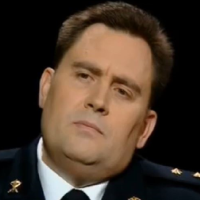Intrigue Swirls around Case of Billion-Dollar Theft from Banks of Moldova that Lands at FBI Doorstep
 Mihail Gofman (photo: Interpol)
Mihail Gofman (photo: Interpol)
By Deb Riechmann, Associated Press
WASHINGTON (AP) — The past months of Mihail Gofman's life read like spy fiction: Fearing he's being followed, he flees his native Moldova in a borrowed car, drives to neighboring Romania and flies to Washington. There he gives U.S. officials information he claims links top Moldovan political leaders and possibly U.S. citizens to a $1 billion heist that gutted the tiny eastern European nation's banking system.
Gofman used to be deputy chief of a government anti-money laundering unit in Moldova, a former Soviet republic sandwiched between Ukraine and Romania. He says he was forced out after speaking about people he said were linked to the theft.
He's holed up in Washington trying to make the case that Americans should care what happened in a little-known country 5,000 miles away — and to help it try to recover the missing money.
The U.S. government already has interests in the former Soviet republic, Gofman argues. The impoverished country has received $44.9 million in U.S. aid this year, plus a $180 million loan from the International Monetary Fund, which is partially supported by U.S. taxpayers. Moreover, Gofman claims to have evidence that at least one American was involved in the theft. His claims could not be independently verified.
Moldova is also important for strategic reasons. The theft has tainted the reputation of the Europe-leaning party that has run Moldova since 2009. Widespread anger kindled support for Igor Dodon, a pro-Russian candidate who won Sunday's presidential runoff election.
Gofman said U.S. authorities reached out to him after he sent documents to the FBI and other federal agencies. He talked with U.S. investigators at least twice in the past couple months. The FBI said it could not comment or confirm the existence of an investigation and it's unclear how deeply it is investigating.
The 2014 theft from the three banks was devastating for Moldova. The amount stolen was equal to more than 12 percent of the country's gross domestic product that year, according to the Congressional Research Service. The money was funneled out of Moldova and laundered through a complex network of offshore entities.
"We understood what they (the thieves) were preparing," Gofman said recently through an interpreter at The Associated Press office in Washington. "They were preparing to steal" the national reserves of Moldova.
So far, authorities have accused only a few individuals as having a role in the theft. One is Ilan Shor, a rich Moldovan businessman named in an independent investigative report on the theft conducted by the Kroll company. The report was commissioned by the National Bank of Moldova.
Another is Vlad Filat, a former prime minister sentenced in July to nine years on charges of taking bribes and influence trafficking. In addition, businessman Veaceslav Platon was arrested in Ukraine and has been extradited to Moldova to face charges.
Gofman says that based on the details he amassed during his work at the money-laundering unit, many more people were involved. His claims are bolstered by former presidential candidate Andrei Nastase, a lawyer and former prosecutor who told AP that he too has met with U.S. investigators, including FBI agents, twice during the past three months.
Nastase said he has seen "evidence that some funds now reside in the U.S. and that some shell companies were created in the U.S."
Among the people that Gofman claims benefited from the theft is Vlad Plahotniuc, a wealthy businessman feared because of his alleged influence over law enforcement and the judiciary. Plahotniuc, who is active in the pro-European party, has repeatedly defended himself, saying he had nothing to do with the theft and had no ties to any of the banks from which the money was stolen. Plahotniuc's name is not mentioned in the Kroll report.
Andrian Candu, speaker of the Moldovan parliament, defended the pro-European party, saying it has worked hard since the theft to fight corruption, implement reforms and arrest judges, customs officials and police officers. He said Plahotniuc has had an active role in helping institute reforms.
Still, many Moldovans were outraged to see photographs of Plahotniuc meeting in May in Washington with Assistant Secretary of State Victoria Nuland. The State Department said Plahotniuc was part of an official delegation visiting from the country.
Gofman decided to leave Moldova after German diplomats advised him to do so in July. "They even told me to photograph what was in my bags so nobody could put something in them, like drugs." Gofman said.
Within an hour of that meeting, after his children helped him photograph the contents of his luggage, he took off unnoticed in a borrowed vehicle. He spent two days in neighboring Romania, where he is a dual citizen, and then flew to the United States.
For now, Gofman is a man without a country. He said U.S. investigators advised him not to return to Moldova — at least not now.
"I hope that in the end we'll solve this," said Gofman, whose wife and three children remain in Moldova. "I'm not going to spend my whole life going from country to country."
- Top Stories
- Unusual News
- Where is the Money Going?
- Controversies
- U.S. and the World
- Appointments and Resignations
- Latest News
- Trump Renames National Football League National Trump League
- Trump to Stop Deportations If…
- Trump Denounces World Series
- What If China Invaded the United States?
- Donald Trump Has a Mental Health Problem and It Has a Name






Comments